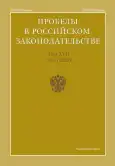Цифровизация изменяет уголовную защиту прав и свобод граждан
- Авторы: Коротких Н.Н.1, Коростиев А.А.1
-
Учреждения:
- Дальневосточный федеральный университет
- Выпуск: Том 17, № 6 (2024)
- Страницы: 169-176
- Раздел: Уголовно-правовые науки
- URL: https://journals.eco-vector.com/2072-3164/article/view/651487
- DOI: https://doi.org/10.33693/2072-3164-2024-17-6-169-176
- EDN: https://elibrary.ru/IOULCQ
- ID: 651487
Цитировать
Аннотация
Широкое распространение и повсеместное использование современных цифровых технологий поставило перед специалистами в области правоприменения ряд сложных вопросов, связанных с расследованием и разрешением уголовных дел. Предложенный теоретиками права механизм привлечения к уголовной ответственности путём введения в Уголовный кодекс РФ нового состава преступления, связанного с использованием цифровых технологий, оказался неудачным решением. Это связано с тем, что наблюдается рост числа преступлений, так или иначе связанных с цифровыми технологиями. В связи с этим данное исследование становится особенно актуальным. Цель исследования — определить, как цифровизация влияет на охрану и защиту общественных отношений в рамках уголовного права. Для достижения поставленной цели необходимо решить следующие задачи: выявить признаки преступлений, совершаемых с использованием цифровых технологий; определить наиболее эффективные способы противодействия таким преступлениям; указать на ошибки, которые чаще всего допускают киберпреступники при совершении преступлений. В работе используются следующие методы: детерминизма, системный, логический, сравнительно-правовой и функциональный. Выводы: Цифровизация трансформирует способы совершения преступлений, повышает их латентность и затрудняет расследование и разрешение уголовных дел. Однако этот процесс можно облегчить, если привлечь высококвалифицированных специалистов (экспертов) в сфере высоких технологий. Наиболее уязвимое место в процессе совершения преступления киберпреступником — это обмен цифровой валюты на обычные деньги, который происходит через биткоин-обменник. Изучив его, можно идентифицировать владельца криптокошелька. Использование цифровых технологий (включая криптовалюту) как способа или орудия преступления следует признать отягчающим обстоятельством согласно статье 63 УК РФ. Это связано с повышенной общественной опасностью такого рода преступлений.
Полный текст
Об авторах
Наталья Николаевна Коротких
Дальневосточный федеральный университет
Автор, ответственный за переписку.
Email: korotkikh.nn@dvfu.ru
ORCID iD: 0009-0003-8791-4859
SPIN-код: 9491-7137
д-р юрид. наук, доцент, профессор кафедры уголовного права и криминологии
Россия, г. ВладивостокАлександр Александрович Коростиев
Дальневосточный федеральный университет
Email: korostiev@bk.ru
SPIN-код: 4354-9360
аспирант
Россия, г. ВладивостокСписок литературы
- Васильева Л.Н., Григорьев А.В. Цифровизация общества и перспективы конституционного развития // Журнал российского права. 2020. N 10. С. 40 - 58.
- Соловых Н.Н. Цифровая экономика диктует необходимость квалифицированных кадров с новыми компетенциями // Российский следователь. 2018. N 5. С. 64 - 68.
- Использование криптовалют в противоправных целях и методика противодействия: материалы Международного научно-практического «круглого стола» (Москва, 25 апреля 2019 года) / под общ. ред. А.М. Багмета. М.: Московская академия Следственного комитета Российской Федерации, 2019. 129 с.
- Ларичев В.Д., Якушева Т.В. Организованная преступность и киберпреступность: вопросы соотношения и законодательного урегулирования // Журнал российского права. 2023. N 3. С. 82 - 99.
- Федоров А.В. Уголовная ответственность юридических лиц и цифровая экономика // Право и цифровая экономика. 2021. N 1. С. 5 - 12.
- Ушаков Р.М. Квалификация хищений, совершаемых с использованием информационных технологий: монография. М.: Юстицинформ, 2023. 160 с.
- Телеграм-канал Банкста // URL: https://t.me/banksta/40916 (дата обращения - 15.05.2024).
- Лузгин А. Что меняет обновленный законопроект о криптовалютах. Подробный разбор // URL: https://clck.ru/3AeATt (дата обращения: 15.05.2024).
- Кузьмичева А. За полгода хакеры украли полмиллиарда долларов в криптовалютах и NFT // URL: https://clck.ru/3Cn5CS (дата обращения: 22.08.2024).
- Елин В.М. Уголовно-правовые инструменты борьбы с кибербуллингом в США // Международное уголовное право и международная юстиция. 2022. N 1. С. 22 - 25.
- Грачева Ю.В., Коробеев А.И., Маликов С.В., Чучаев А.И. Уголовно-правовые риски в сфере цифровых технологий: проблемы и предложения // Lex russica. 2020. N 1. С. 145 - 159.
- Смирнов А.В. Электронные доказательства, электронное доказывание, искусственный интеллект: что далее? // Уголовное судопроизводство. 2024. N 1. С. 24 - 31.
- Саурин А.А. Цифровизация как фактор трансформации права // Конституционное и муниципальное право. 2019. N 8. С. 26 - 31.
- Антонович Е.К. Правовая помощь по уголовным делам в цифровом обществе // Актуальные проблемы российского права. 2021. N 11. С. 167 - 173.
- Лазарев В.В. Юридическая наука в свете перспектив цифровизации // Журнал российского права. 2023. N 2. С. 5 - 19.
- Миронова Е.Ю. Нравственные начала уголовного процесса в условиях цифровизации: принципиальная незыблемость или неизбежная трансформация // Актуальные проблемы российского права. 2023. N 1. С. 136 - 149.
- Калканов С.С. Перспективы развития электронного документа в ходе цифровизации уголовного судопроизводства: к вопросу защиты прав мигрантов // Миграционное право. 2020. N 4. С. 16 - 18.
- Таболина К.А., Таболин В.П. Надзор прокурора в уголовном судопроизводстве в условиях развития цифровых отношений // Актуальные проблемы российского права. 2023. N 4. С. 115 - 123.
Дополнительные файлы








